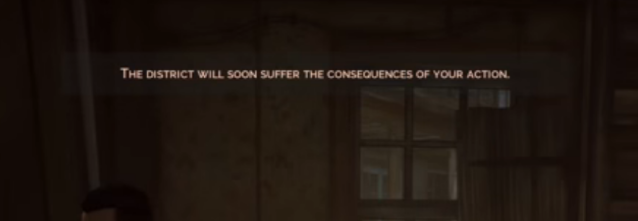(Welcome to part seven of our mini-series on Vampyr. If you missed part one, you can find it here. Today we’ll be messing up really badly, and then writing five hundred words about how it’s not our fault. Today’s post title is a play on the Vampyr chapter ‘Blackmail in Whitechapel’, because blood is red. I will continue writing these terrible puns – you can’t stop me.)

I finished last week’s post with some high praise, so in the interest of balance it’s time for some serious mud-slinging.
We’ve just discovered Nurse Crane’s secret medical clinic, and helped her in her (doomed) attempt to save a patient’s life, but now it’s time for the business that brought us here: her blackmailing of Lady Ashbury.
Turns out Nurse Crane is using the blackmail money not for her own benefit, but to fund this very clinic. On top of that, she doesn’t actually know that Lady Ashbury is a vampire – instead thinking that she just murders patients at Pembroke hospital for her own sick enjoyment. But I suppose blackmail concerning non-vampiric murder is still pretty damning, so much as I (a) think a free clinic for London’s destitute is pretty good, and (b) trust Lady Ashbury about as far as I could throw her, we’re unfortunately not given the option of backing off and letting Nurse Crane go about her business.
Instead, the game gives us three choices for how to put a stop to Nurse Crane’s blackmail: (a) kill her, (b) let her keep her clinic but force her to leave Pembroke Hospital, or (c) use our vampire mind powers to make her forget all about Lady Ashbury:

With great vampire mind power comes great vampire mind responsibility.
I chose to use my vampire mind powers on her to wipe her memory of Lady Ashbury. It seemed like a no-brainer: let her keep working at the clinic (albeit with fewer resources) AND at Pembroke Hospital – just remove her memories of Lady Ashbury killing people. Win-win, right? Well…no.
What happens next was quite confusing – instead of making her forget Lady Ashbury’s dark secret, Reid decides to make Nurse Crane forget everything about not just Lady Ashbury, but also Pembroke Hospital and this free clinic of hers. Why? Well, I’m actually not sure – it doesn’t really make sense, and it’s certainly not what I imagined Reid would say when I moused over ‘You will forget all about this’ on the dialogue wheel.
Either way, Reid attempts to mesmerise Nurse Crane, but she does her best to resist us, and when we’re done she seems confused; punchdrunk – barely able to speak. Just as I’m standing there wondering what happened, the following text pops up on the screen: ‘The district will soon suffer the consequences of your action’. Hmm…
When we next rest and level up, we find out that Nurse Crane has gone missing. Hmmmm……..

Reid’s acting as he breaks Nurse Crane’s resolve is top notch stuff.
I was really confused here. What did my mind powers do to her? Why only now, and not with other people I’ve used them on in the past? And why did she disappear all of a sudden? Well, spoiler alert: it turns out that using your vampire mind powers on someone who’s extremely strong-willed, and who attempts to resist you, can actually end up kind of sort of breaking their mind…permanently. Nurse Crane is extremely strong-willed – moreso than other citizens I’ve spoken to – and she did her best to resist me. Now her mind’s gone, and it’s not coming back.
How do I know this? Well, turns out there’s an optional note on a desk somewhere all the way back in Pembroke Hospital that describes this unfortunate possibility. Never having read that note, I didn’t know about the risk, and didn’t think twice before mesmerising Nurse Crane.
Now, this is a actually really cool idea – place optional-yet-important information around your game world so that diligent players are rewarded with all the necessary information they need to make good decisions, and the well-intentioned decisions of less diligent players end up backfiring on them without warning.
It also doesn’t feel like an unfair ‘gotcha’ moment for our mind powers to backfire here – these are magic vampire powers, and Reid became a vampire like yesterday. He still knows next to nothing about his condition, so of course there could be weird dangers he’s unaware of.

I messed up.
So this has all the ingredients to be a great twist-the-knife moment. Unfortunately the way Vampyr handles it is kind of terrible. I’ve already mentioned the problems with Reid’s decision to wipe so much of Nurse Crane’s memory, and it’s worth noting that this weird choice wasn’t even necessary for the moment to work – if Reid had just tried to erase her memory of the blackmail (like I assumed he would), the mind-breaking-vampire-power outcome would have been the same.
But the real problem here is that while it’s fine – and actually very cool – to punish a player for not exploring by withholding information necessary for certain story choices, if you’re going to do that, the player has to understand that you did it in the first place. In other words, if the player doesn’t ever go on to learn about that optional, missable information they won’t know why the bad outcome happened, and they’ll just end up confused.
I never found the note that warns about the risk of breaking strong-willed people’s minds, so I really had no clue what happened. One moment I’m mesmerising people left, right, and centre – the next moment I’ve permanently broken somebody’s brain. And no one ever explains why.
It’s only after I read about this moment on the internet (while trying to figure out what happened) that I learned about the note. Once I went and read it on the Vampyr wiki I thought ‘Ohhhh, that makes sense. Damn, I should have been more careful.’. But unless the player happens to stumble upon that one note later on, or look things up on a wiki, Vampyr never gives them the context that lets them understand what exactly happened, and why.

We’ll find out what happened to Nurse Crane later, don’t worry.
If, for example, I had chosen to mesmerise Nurse Crane, broken her mind, and then later been told by Lady Ashbury or Dr. Swansea: ‘Oh, I guess you didn’t know about the risks of mesmerising strong-willed people. Well…‘, then I would have immediately thought ‘Ohhhh, that makes sense. Damn, I should have been more careful.’. Instead of spending the next few hours of the game frustrated and confused, repeatedly thinking: ‘I still have no idea why that happened’.
This leads nicely into…
THIS WEEK’S INSIGHTFUL GAME DESIGN LESSON:
When you play around with how much information you give the player, you have to be extremely careful.
When the player is making a choice it’s perfectly reasonable for the consequence of that choice to be unclear, but the choices should be clear as day. If the player has no idea what the player character will do when they select an option, you’ve messed up, and any potential emotional impact of the choice will be lost.
Similarly, if the player can make a bad choice because they lack information, you have to provide them that information later on, or any impact of that twist will be lost.
More generally, if you withhold information from the player and then use it against them, you have to make sure they understand that information was withheld. You have to provide the context they originally missed, otherwise they won’t understand that there was even context missing in the first place, and will just think the game is delighting in throwing arbitrary curveballs their way (in other words, if the player’s response to a bad outcome is ‘huh?’ you’ve messed up big time).
Imagine playing an RPG, and at one point one of your party members betrays you, kills another party member, and runs off. There was an optional sidequest you missed earlier in the game that would have given you a hint that they were actually a double agent working for your enemy, but you never found that hint. And then after they betray you they never show up or are heard about again. Think about how weird and confusing that would be.
Now imagine that after they betray you there’s a quest that re-shows you some version of that original hint you missed. It wouldn’t negatively affect people who found the hint originally, but it would provide crucial context for players who missed it.
Vampyr doesn’t provide that context for people who missed it the first time, and so the impact of this moment – this moment that should be amazing – is completely lost.

The kind Lady Ashbury.
Regardless, we leave the near-catatonic Nurse Crane, and exit the clinic. On the way out we’re waylaid by a gang of Priwen vampire hunters, but they don’t really put up much of a fight. It’s time to head back to Lady Ashbury and give her the good news that we destroyed a woman’s brain and doomed her many patients to various slow deaths. Read next week’s post to find out how that goes (I’m sure it will go really well).
For now, though – as always, you can follow me on Twitter by clicking here. And if you like RPG Autopsy – why not be lovely by supporting me on my newly-opened Patreon?Alternatively, if you hate RPG Autopsy – why not spite me by supporting me on my newly-opened Patreon? Find that Patreon here.
Also, I’m going to be away in Kyoto attending BitSummit next week, so RPG Autopsy is going to take a week off. See you in two weeks time!